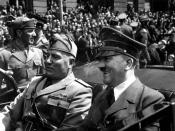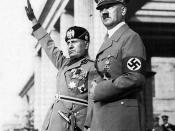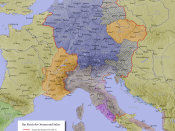Today, Germany is one of the strongest countries in Europe. It has one of the largest populations and has a GNP capita over $25,000, which makes it one of the richest countries in the world. But Germany hasn't always been this way. Germany has a very complex history. It was slow to become a unified country compared to a lot of other industrialized countries, and this led to a lot of her political difficulties in the 20th century.
To understand the difficulties that Germany had after unifying, we must learn a little history about Germany. During the early Middle Ages, Germany had the most advanced political systems of its time. It was ruled by the Holy Roman Empire (known as the First Reich). But the German part of the Holy Roman Empire started to break up because of the Thirty Years War in 1618, when the Catholics and Protestants split.
Germany then became divided into Catholic and Protestant states. The first steps towards unification came late in the 17th century when Frederick William and Fredrick the Great gained control of all of Germany. Because Germany was very poor, the Prussians taught the Germans discipline and strengthened their authoritarian values.
Prussian expansion was stopped shortly by the Napoleonic Wars. Napoleon and the Congress of Vienna both consolidated many German states. Under the leadership of Chancellor Otto von Bismarck, Prussia had won a few wars against Denmark, Austria, and France between 1864 and 1870. So by 1870, Prussia had all of the German states back under their control. In 1871, these Prussian states asked the Prussian king, Wilhelm I, to become Kaiser of the new Second Reich.
So came along the Social Democratic Party or SPD. It was large but had no political influence at the time. The newly reformed German...


